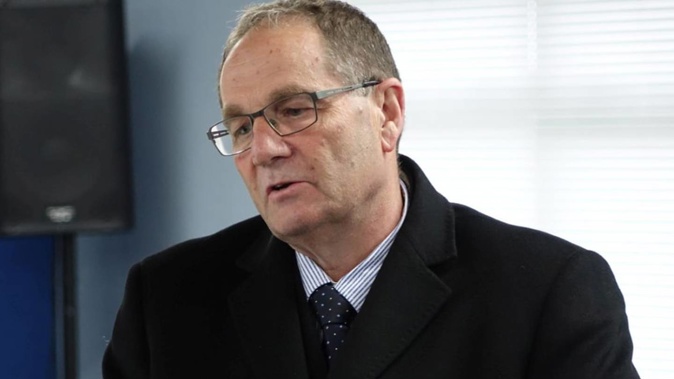
Former National Party minister Chester Borrows says the solutions to youth crime are better social supports, and we must be prepared to pay for it as a society.
National’s leader Christopher Luxon yesterday announced the party’s youth crime policy, which includes a plan to create a new criminal category for those aged 10 to 17 who committed serious crimes like ram raids and armed burglary more than once.
These would face sentences including electronic monitoring like ankle bracelets, community service - or, for those aged 15-17, being sent to new military academies.
Left-leaning parties were outraged at the idea of such boot camps, saying they had been tried by National before and all the evidence showed they did not work.
A sceptical Hamilton councillor was swayed by the inclusion of wraparound support services, but youth workers were uniformly opposed and argued targeted interventions could be achieved without military “re-programming”.
Borrows, and International Science Council president Sir Peter Gluckman, say while National’s boot camps proposal may or may not have some kind of effect, the best approach would be to test and analyse programmes and expand those that work.
‘I hope that we get past cliches and billboards’ - Borrows
Minister for the courts in John Key’s National government, Borrows has spent 45 years in the sector, including as a police officer, lawyer, member of the parole board, and writing “those much-maligned section 27 cultural reports”.
He also chaired the work on the Uepū Hāpai i te Ora review of the criminal justice system - a system he said was well and truly broken.
He told Nine to Noon the camps trialled under that government were run at youth justice precincts in Christchurch in partnership with the military, and included psychological assessment. They had some positive effect, but it usually didn’t last long.
“They responded very well to the role modelling that was going on around them, the problem was that obviously this stopped and then they went back into the environments that they had been offending in,” he said.
- Youth development worker gives thumbs down to Nat's new youth crime policy
- Chris Luxon unveils solutions to prevent youth crime and ram raids
- National plans crack down on youth offending, including military academies
“So the good stuff lasted for a little while in some cases, for a long time in fewer cases, and in some cases it didn’t really do much at all for those who had been through the programme and you couldn’t really tell a lot after the event.
/cloudfront-ap-southeast-2.images.arcpublishing.com/nzme/U6F4STJ66NAAJDX4XXVLHJUPLQ.jpeg) Chester Borrows' career as an MP ended after he did not stand in the 2017 election. Photo / Phil Smith, RNZ
Chester Borrows' career as an MP ended after he did not stand in the 2017 election. Photo / Phil Smith, RNZ
“The other thing was that there were only small numbers, so it was difficult to get a very good head-look at what was happening.”
Reviving that kind of policy looked good on a poster or billboard, he said, but was cliched and would not get to the root of the problem. The boot camp idea would stop them offending in the short term - it was the long-term effects that were a concern.
“I think it keeps coming back because it’s popular with a certain sector of the community,” he said.
“People like to think that these are the answers to problems within the criminal justice system: ‘lock them up for longer, throw away the key, feed them on bread and water’, all those sorts of things that we used to hear in our day when we were kids, we’ve tried it for 30 years, it hasn’t happened.”
Ankle bracelets sounded good but would not work either, he said - they would simply be removed and the young person’s behaviour would not have changed.
Borrows said he did not know why National was not putting more focus on some of the other aspects of its 2008 youth justice approach, including having young people appearing in adult courts for sentencing which he said helped cut the number of young people offending.
“The community is crying out for a lot more precision in this sort of policy, and they’re not getting it from these sort of cliched style suggestions.
“I hope that we get past cliches and billboards and actually talk about the actions we need to take in a very precise manner, and how we can ensure that kids don’t go down this track.”
‘You have to recognise who is going to be the most help’ - Borrows
Borrows supported the social investment model championed by Bill English, but said it needed to be applied with precision and investment.
“We were able to identify the 3000 young people born in any one year who were likely to grow up and go to prison ... we knew their names and where they lived, and their parents, so when you know that sort of stuff you can actually intervene in people’s lives radically to make sure that they have the support they need.”
What was needed was the kind of social programmes and mentoring which could model good parenting, education engagement and making use of spare time, he said.
/cloudfront-ap-southeast-2.images.arcpublishing.com/nzme/RZMORKLRYFGVHCQ4CKZ6373O74.jpeg) Bill English led the social investment approach to social services, an early intervention approach which focused on providing funding to community-based solutions to social problems. Photo / Rebekah Parsons-King, RNZ
Bill English led the social investment approach to social services, an early intervention approach which focused on providing funding to community-based solutions to social problems. Photo / Rebekah Parsons-King, RNZ
“When we look at some of the programmes around the country where these things have happened - with for instance Start Taranaki, and Yesteryouth Whanganui ... we’ve seen significant gains there and really good stories that come out of it but no one wants to put them on a billboard.”
For the more serious offenders like those doing the ram raids, social workers and community police officers likely knew the families involved and needed to be able to intervene
“Those people - government servants working on our behalf - need to intervene and to hold not only those young offenders to account that those who are putting them up to committing the crime, and then to investigate why they’re doing that at the time
“Why have they got that opportunity to be out at three o’clock in the morning as a 10-year-old, and who’s monitoring them and their behaviour, and who’s making sure that they’re tucked up in bed and ready to have a good day at school the next day?
“And if they’re not, then there’s an obligation on people to make sure that they do, an obligation on us as a civilised society, hopefully, to assist those families in order to be able to do that.”
The state needed to be careful, however, about putting children into care - a significant move Borrows said often had damaging effects.
“Oranga Tamariki are doing that on a daily basis but we need to recognise that if we’re going to do that we need to put in significant supports - pou - around those young people to make sure for instance, that they’re educated that they have got good role models, and that they are well mentored.
“It’s no good taking one culture and imposing it on another, or one ethnicity and imposing it on another - you have to recognise who is going to be the most help here and be prepared to pay for it as a society.”
‘We’re actually living in a world where we have changed the boundaries’ - Gluckman
Sir Peter Gluckman also worked for John Key’s government as the chief science adviser to the prime minister, and wrote the report which eventually saw the camps retired to the scrap heap.
That report could find no evidence, either internationally or based on New Zealand’s experience, that the camps on the whole worked to turn young people’s lives around.
However, he told Morning Report the world had changed since then.
“This is the first generation that has grown up embedded in a world driven by social media, and all the expectations and implications of it - and I think that fundamental to that has been the loss of boundaries,” he said.
/cloudfront-ap-southeast-2.images.arcpublishing.com/nzme/4WN72TE75VFWHKWL5XI4JTOZ2I.jpeg) Sir Peter Gluckman is an internationally recognised scientist who originally trained as a paediatrician. Photo / RNZ
Sir Peter Gluckman is an internationally recognised scientist who originally trained as a paediatrician. Photo / RNZ
“We have created a world in which we have tolerated young people having broader boundaries, because we want broader boundaries ourselves.”
He suggested National’s latest proposal - with a longer timeframe and wraparound supports - might be worth trying, but like any new social programme it should be backed up by testing and measurement.
“The reality is the literature out there for boot camps - which were largely developed in a different era for children that grew up in a different sociological context - is that they don’t work.
“I have no problem with any government - left or right or any shape - trying out new programmes, but they should be done in a way that evaluated independently, where the data is collected, where the pilot is done, and the results are transparent. We are very good in this country at developing social programmes and saying they’re going to work and we don’t know if they ever work or not.”
The longer-term goals like rehabilitation, restoration and social emotional development would not be achieved simply through putting young people in a disciplinary environment, he said.
The young people carrying out serious crimes did need to be addressed, he said, but so did the perpetual cycles of disadvantage - and there was too little focus on the first few years of young people’s lives in New Zealand.
“We’re not good at wraparound services in this country. Early Childhood Education is not quality in many places. Education and schools have become more limiting in terms of support for a variety of reasons. And the nature of education itself, may have to change.”
The type of interventions and integrated policy-making the social investment model intended were part of the solution, he said.
-Russell Palmer, RNZ
Take your Radio, Podcasts and Music with you









